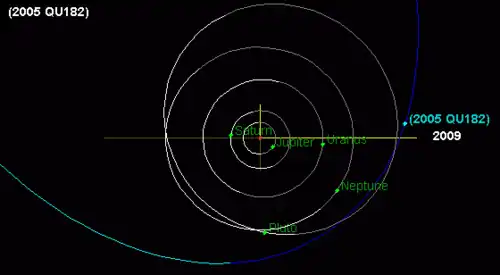(303775) 2005 QU182
(303775) 2005 QU182, also written as (303775) 2005 QU182, is a trans-Neptunian object with a bright absolute magnitude of ca. 3.6.[4]
| Discovery[1] | |
|---|---|
| Discovered by | |
| Discovery date | 30 August 2005 |
| Designations | |
| 2005 QU182 | |
| TNO (SDO)[2][3] | |
| Orbital characteristics[4] | |
| Epoch 13 January 2016 (JD 2457400.5) | |
| Uncertainty parameter 2 | |
| Observation arc | 13642 days (37.35 yr) |
| Aphelion | 184.19 AU (27.554 Tm) (Q) |
| Perihelion | 36.827 AU (5.5092 Tm) (q) |
| 110.51 AU (16.532 Tm) (a) | |
| Eccentricity | 0.66675 (e) |
| 1161.74 yr (424325.7 d) | |
| 13.854° (M) | |
| 0° 0m 3.054s / day (n) | |
| Inclination | 14.032° (i) |
| 78.395° (Ω) | |
| 223.69° (ω) | |
| Earth MOID | 35.8244 AU (5.35925 Tm) |
| Jupiter MOID | 31.769 AU (4.7526 Tm) |
| TJupiter | 6.711 |
| Physical characteristics | |
| Dimensions | 416±73 km[5] |
| 9.61 h (0.400 d) | |
| 9.61 hr[4] | |
| 0.328+0.160 −0.109[5] | |
| 20.9[6] | |
| 3.80±0.32,[5] 3.6[4] | |
Distance
It came to perihelion in 1971[4] and is currently 51.8 AU from the Sun.[6] In April 2013, it moved beyond 50 AU from the Sun.
It has been observed 81 times over 10 oppositions with precovery images back to 1974.[4]

2005 QU182 takes over 1,200 years to orbit the Sun. Among large TNOs, only Sedna, 2012 VP113, 2013 FS28 and (445473) 2010 VZ98 have a longer orbit around the Sun.[7]
References
- "MPEC 2007-R03 : 2004 PF115, 2004 PG115, 2004 XA192, 2005 QU182". IAU Minor Planet Center. 1 September 2007. Retrieved 26 August 2009.
- "List Of Centaurs and Scattered-Disk Objects". Minor Planet Center. Retrieved 22 January 2009.
- Marc W. Buie (24 October 2008). "Orbit Fit and Astrometric record for 05QU182". SwRI (Space Science Department). Retrieved 9 December 2008.
- "JPL Small-Body Database Browser: (2005 QU182)" (last observation: 2009-09-18). Retrieved 7 April 2016.
- Santos-Sanz, P.; Lellouch, E.; Fornasier, S.; Kiss, C.; Pal, A.; Müller, T. G.; Vilenius, E.; Stansberry, J.; Mommert, M.; Delsanti, A.; Mueller, M.; Peixinho, N.; Henry, F.; Ortiz, J. L.; Thirouin, A.; Protopapa, S.; Duffard, R.; Szalai, N.; Lim, T.; Ejeta, C.; Hartogh, P.; Harris, A. W.; Rengel, M. (2012). ""TNOs are Cool": A survey of the trans-Neptunian region IV. Size/albedo characterization of 15 scattered disk and detached objects observed with Herschel-PACS". Astronomy & Astrophysics. 541: A92. arXiv:1202.1481. Bibcode:2012A&A...541A..92S. doi:10.1051/0004-6361/201118541. S2CID 118600525.
- "AstDys 2005QU182 Ephemerides". Department of Mathematics, University of Pisa, Italy. Archived from the original on 26 May 2011. Retrieved 16 March 2009.
- "JPL Small-Body Database Search Engine: H < 6 (mag) and a > 80 (AU)". JPL Solar System Dynamics. Retrieved 14 June 2014.
External links
This article is issued from Wikipedia. The text is licensed under Creative Commons - Attribution - Sharealike. Additional terms may apply for the media files.
_(cropped).jpg.webp)
